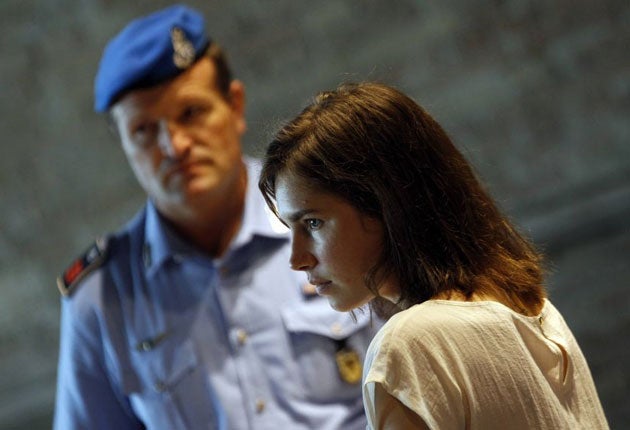DNA experts highlight problems with Amanda Knox case

Your support helps us to tell the story
From reproductive rights to climate change to Big Tech, The Independent is on the ground when the story is developing. Whether it's investigating the financials of Elon Musk's pro-Trump PAC or producing our latest documentary, 'The A Word', which shines a light on the American women fighting for reproductive rights, we know how important it is to parse out the facts from the messaging.
At such a critical moment in US history, we need reporters on the ground. Your donation allows us to keep sending journalists to speak to both sides of the story.
The Independent is trusted by Americans across the entire political spectrum. And unlike many other quality news outlets, we choose not to lock Americans out of our reporting and analysis with paywalls. We believe quality journalism should be available to everyone, paid for by those who can afford it.
Your support makes all the difference.The investigators who collected the genetic evidence used to convict American student Amanda Knox of murder in Italy made a series of glaring errors, including using a dirty glove and not wearing caps, two independent forensic experts said today.
The experts had been appointed by an Italian appeals court to review the DNA evidence used in Knox's trial, including some found on a kitchen knife believed to be the murder weapon and some found on the clasp of the victim's bra.
That evidence played a crucial role in securing the convictions of Knox and her co-defendant Raffaele Sollecito in the 2007 murder of Meredith Kercher, a Briton who shared an apartment with Knox while they were both exchange students in the city of Perugia.
Knox, 24, and Sollecito, 27, have denied wrongdoing and have appealed. The evidence review was granted at the request of their defence teams.
In the first trial, prosecutors maintained that Knox's DNA was found on the handle of the kitchen knife and Kercher's DNA was found on the blade. They say Sollecito's DNA was found on the clasp of Kercher's bra.
But the independent experts told the appeals court that the collection of evidence fell below international standards and may have resulted in contamination. They used slides to refer to international protocols for the collection and sampling of evidence, including one from the US Department of Justice and others from various US states.
One of the two experts, Stefano Conti, cited dozens of cases of forensic police entering the crime scene or coming into contact with objects there while not wearing protective equipment such as masks or hair caps. He said that while evidence should be wrapped in paper or kept in a paper bags, police often used plastic bags, heightening the risk of contamination.
"There are various circumstances which do not adhere to protocols and procedures," the forensic expert told the court.
In footage and framegrabs shown to the court, two police officers collected the bra clasp, and the glove worn by one of the two appeared to be dirty on two fingers. Conti noted the bra clasp was collected 46 days after the November 1, 2007 fatal stabbing of the 21-year-old Kercher.
"Over those 46 days several objects were moved, and in at the same time several people will have come in and out," he noted, again stressing the risk of contamination.
The other expert, Carla Vecchiotti, explained to the court that the genetic profile on the knife's blade that was attributed to Kercher is dubious and cannot be attributed with certainty. She said no blood traces were on the blade, and that the original testing did not follow recommendations of the international scientific community for dealing with DNA testing.
Vecchiotti said the review concurred with the original testing in saying that the genetic profile on the knife's black plastic handle could be attributed to Knox. The knife was found at Sollecito's apartment. Kercher's body was found at the apartment she shared with Knox.
The hearing today was a tense one, with the parties frequently challenging the experts. The typically calm Claudio Pratillo Hellmann, the presiding judge, at one point slammed his hand on his desk and shouted, "Quiet!"
The independent experts, both from La Sapienza University in Rome, will be questioned and cross-examined in the next hearing, scheduled for Saturday. That will be the last hearing before the summer break.
The full review, a 145-document obtained by The Associated Press, was filed to the Perugia court last month.
Defence lawyers immediately welcomed the report, hoping it will boost their clients' chances of overturning their convictions.
Knox's mother, Edda Mellas, said today's hearing marked a good day for her daughter, though she has repeatedly cautioned during the trial that she will only celebrate if Knox walks free when a verdict is reached in late September.
Giulia Bongiorno, a lawyer for Sollecito, said that what had been so far only a defence theory — claiming that there was a risk of contamination and that DNA traces were too low to be attributed with certainty — has now been certified by independent experts.
"These aren't opinions, words. These are images," she said, referring to the clips shown in court.
But Francesco Maresca, a lawyer for the Kercher family, promised that a fierce cross-examination of the experts next week would prove the work of the forensic police had been up to snuff.
He added: "The Kercher family is very worried over this inquisitorial atmosphere around the serious job done during the investigation."
AP
Join our commenting forum
Join thought-provoking conversations, follow other Independent readers and see their replies
Comments